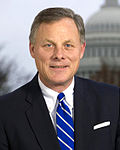| |||||||||||||||||
| |||||||||||||||||
Burr: 40–50% 50–60% 60–70% 70–80% 80–90% >90% Marshall: 40–50% 50–60% 60–70% 70–80% 80–90% >90% Tie: 40–50% | |||||||||||||||||
| |||||||||||||||||
| Elections in North Carolina |
|---|
 |
The 2010 United States Senate election in North Carolina was held on November 2, 2010. The filing deadline for the primaries was February 26; the primaries were held on May 4, with a Democratic primary runoff held on June 22. [1] Incumbent Republican U.S. Senator Richard Burr won re-election to a second term. Burr is the first incumbent to win re-election for this seat since Sam Ervin's last re-election in 1968. [2]
Contents
- Background
- Republican primary
- Candidates
- Polling
- Results
- Democratic primary
- Candidates 2
- Polling 2
- Results 2
- General election
- Candidates 3
- Campaign
- Debates
- Predictions
- Polling 3
- Fundraising
- Results 3
- See also
- References
- External links
Burr was the first Republican re-elected to this seat. Burr's 54.8% also represented the highest vote share a North Carolina Republican received since the state began directly electing its senators.
This was one of the five Republican-held Senate seats up for election in a state that Barack Obama won in the 2008 presidential election.





